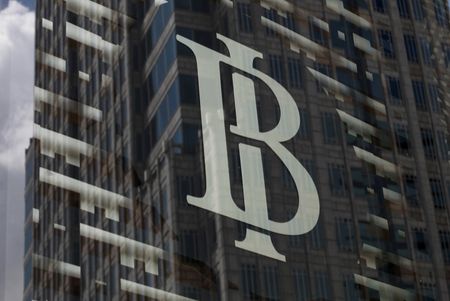By Gayatri Suroyo and Stefanno Sulaiman
JAKARTA (Reuters) -Indonesia’s central bank kept policy rates steady on Wednesday, as expected, and reiterated it would likely have room to cut borrowing costs in the second half of the year, despite market predictions of an earlier easing.
Growth in Southeast Asia’s largest economy fell slightly last year amid lower commodity prices, though at 5.1%, it remained one of the fastest among countries in the Group of 20 major economies.
Some economists expect economic growth to remain around that level as last week’s presidential and parliamentary elections and the expected smooth transition of power in October affect investment decisions.
Bank Indonesia (BI) left its benchmark 7-day reverse repurchase rate at 6.00%, where it has been since October, saying current levels were consistent with efforts to keep the rupiah currency stable and inflation in check.
The move was widely expected by economists polled by Reuters. A majority of economists in the survey also predicted BI would deliver its first rate cut next quarter to sustain growth.
At a press conference after the policy meeting, Governor Perry Warjiyo said BI’s baseline scenario remained that its policy pivot would be in the second half, highlighting its expectation for the U.S. central bank to also cut rates in the same period.
“The BI rate for sometime will be kept unchanged. Be patient. Until when? We have already given a hint that the baseline plan is in the second half,” Warjiyo said, adding any easing hinges on inflation and movements in the rupiah’s exchange rate.
The governor focused his commentary on external factors, arguing that better than previously anticipated global growth would help Indonesia’s economic expansion this year, though he also warned of risks from potential supply chain disruption from geopolitical tensions and recession in some countries.
BI kept its 2024 economic growth forecast in a range of 4.7% to 5.5%.
Inflation in Indonesia has stayed within BI’s target range since the middle of last year, with the central bank’s 250 basis points (bps) in rate hikes between August 2022 and October 2023 keeping price pressures in check.
The rupiah, down about 1.7% against the U.S. dollar so far this year, strengthened 0.16% following BI’s decision.
“With the recent elections laying the ground for stability and policy continuity, the central bank is likely to be focused on the spillover risks from global developments and geopolitics, including Red Sea disruptions, while staying on an extended pause,” said DBS economist Radhika Rao.
Markets had cheered the victory of Defence Minister Prabowo Subianto, after so-called quick ballot counts by independent pollsters showed he had won the presidency with nearly 60% of votes.
However, economists and rating agencies have also flagged rising fiscal risks due to Prabowo’s costly campaign promises.
Asked about the election outcome, the governor said existing Indonesian laws on the annual fiscal deficit ceiling would ensure prudent fiscal policy management.
“Indonesia has a very long standing tradition that fiscal deficit cannot be above 3% of GDP, I think this will also give support to our fiscal policy prudency by the government,” Warjiyo said in a conference call with investors.
He also underlined the central bank is independent from the government.
(Reporting by Gayatri Suroyo, Stefanno Sulaiman and Fransiska Nangoy; Editing by Kim Coghill and Mark Potter)










